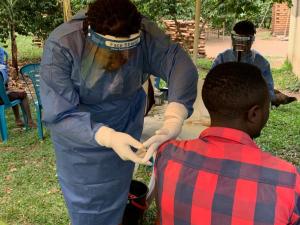Uganda Village joins forces to Fight Ebola
11 July 2019. Bwera, Uganda – When Godfrey and his wife Jennifer fell sick with vomiting and fever, their first thought was Ebola. Their neighbours in Muhindi, a small village in Kasese District of Uganda, had the same fear. But, thanks to their community surveillance training, all of them knew what to do.
Godfrey and Jennifer alerted their village health team who got in touch with the local Ebola Alert team. They agreed that the couple, along with their two children (aged 6 and 4), should be admitted to the isolation and treatment unit at Bwera Hospital for testing.
When the family of four stepped out of the Ebola Treatment Unit 48 hours later it was with some trepidation. Fortunately, it turned out that Godfrey and his family were suffering from nothing more serious than food poisoning. But while they were happy to have been declared Ebola disease-free, they were unsure of how they would be treated by their community.
There is a lot of fear in their society because the Ebola-ravaged areas of the Democratic Republic of the Congo are just across the porous border. In June, the first cases of Ebola in Uganda were confirmed in a family who had recently travelled to the DRC. All three patients died.
Communities in the area have been educated about Ebola symptoms and treatment, and although the disease is feared, they understand that community surveillance is vital to save lives.
“They are free of Ebola,” said Kelet Bogere, Psychosocial Officer with the Ministry of Health, “The next step for the family is to be re-introduced back to the community so that no one thinks they have escaped from the treatment centre.”
The drive to Muhindi Village is along a steep and winding road which heads towards Ruwenzori mountain. In the village, the people were tense with anticipation. They stood at a distance as the family alighted from the vehicle. The village leader and an elder from the family stepped forward and then suddenly stopped, unsure of what they should do – to shake hands, embrace or wave.
Kelet stepped forward to manage the situation.
“Come closer because I have brought you good news,” he raised his voice for all to hear. “Your people do not have Ebola. I have returned them to you.”
Suddenly there was a surge forward by family members. They embraced and the children were taken from Jenifer and Godfrey’s arms. There was ululation and loud chatter. They surrounded them, expressing gratitude for their safe return.
“We were terrified that the worst had happened to our community,” said Bogonza Johnson, the village chairperson. “Everyone was scared. Thank you for reassuring us and for returning them to us.”
Everyone gathered around as Kelet explained what had happened. He praised the village leadership and the family for making the right decision to allow the affected family members to be taken into isolation for Ebola tests in order to protect the rest of the community.
“Now that the results were good, we must remain vigilant against Ebola disease,” Kelet continued. “We must fight Ebola together, by being open.”
Godfrey stepped forward to tell his friends and family about his experience at the Ebola Treatment Unit.
“We were treated well at the hospital but I am so happy to come back,” he said. “When we fell ill, I thought we had Ebola and I did not want my family to be the one that would spread it to the rest of the village. That’s why we called the doctors.”
A combined effort by the World Health Organization (WHO), the Ministry of Health and other partners is working to entrench community based surveillance systems within communities so that suspected cases of Ebola are reported quickly. These efforts are paying off as communities take on the responsibility of fighting the disease.
“Community surveillance is the ultimate solution that will keep everyone on the alert. There will be no more surprises. We are really pleased to see several communities becoming part of this process,” said Dr Felix Ocom, WHO Surveillance Team Leader in Kasese.
Uganda currently has no Ebola cases. The country is continuing its vigilance.
Health Promotion Advisor
Tel. : +256 414 335505
Cell: +256 772 507906
Email: sensasib [at] who.int
Public Information Officer
Tel. : +256 313 335569
Cell: +256 786 497073
Email: mwebembezie [at] who.int
WHO communications consultant
Email: jkisaid [at] gmail.com
Tel: +254 791 197 454 (Whatsapp)



